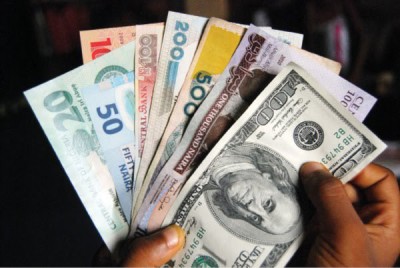
Nigeria’s government is set to carry the burden of boosting the economy as the central bank signaled it won’t ease currency controls that are hurting businesses.
President Muhammadu Buhari is seeking to compensate for plunging oil revenue and the slowest growth in 16 years by boosting spending by a fifth to 6.1 trillion naira ($30.6 billion) this year. With Governor Godwin Emefiele on Tuesday resisting pressure to ease foreign-exchange restrictions and devalue the naira, fiscal stimulus may need to take the lead in sparking a rebound.
“In an economic situation like this, you can spend yourself out of recession,” Sewa Wusu, head of research at Sterling Capital Markets Ltd., said by phone from Lagos, the commercial capital. “The government announced an expansionary budget. The central bank believes, if it is well implemented, it can jump-start the economy.”
The central bank’s restrictions on imports and currency trading are hurting businesses such as PZ Cussons Plc, a soap and detergent maker, and oil producer Shoreline Group as they grapple with falling demand.
Growth in Africa’s biggest crude producer slowed to 3 percent last year from 6.3 percent in 2014, according to the International Monetary Fund. The economy is set to expand 4.1 percent this year, the lender forecasts.
Budget Deficit
Buhari has proposed boosting capital spending by more than triple to 1.8 trillion naira this year to pay for projects such as roads, housing and power plants in a country of more than 170 million people. The deficit will widen to 3 trillion naira, or 3 percent of gross domestic product, funded by additional borrowing, including possibly $1 billion in Eurobonds.
The National Assembly is yet to approve Buhari’s budget plans.
The governor on Tuesday called for coordination of fiscal and monetary policies to help steer the economy away from oil dependence. Nigeria relies on oil for almost all exports and two-thirds of government revenue. Prices have dropped by half since June to about $30 a barrel.
“Government is the highest spender in the economy,” Kunle Ezun, an analyst at Ecobank Transnational Inc., said by phone from Lagos. “The central bank wants to take the back stage and allow the fiscal authority to drive the economy. When the government starts spending, businesses are expected to recover and the economy will pick up.”
Naira Peg
The central bank has effectively pegged the naira at 197 to 199 per dollar since March by restricting the supply of dollars. That’s caused the black-market rate to fall to a record low of about 306 on Tuesday, fueled speculation of a devaluation and prompted investors to cut holdings of Nigerian assets.
Rising spending and looser monetary policy may add to pressure on inflation, which accelerated to a three-year high of 9.6 percent in December. The inflation rate has been above the central bank’s target of 6 percent to 9 percent since May.
“The central bank has done what it can do, except devalue,” said Ezun. “Devaluation is imminent, the question is when? By mid-year, when the budget implementation is in full swing and it becomes more obvious the government needs naira to push through its infrastructure development plans, and oil prices continue to look down in outlook, they might be forced to devalue.’’
END

Be the first to comment